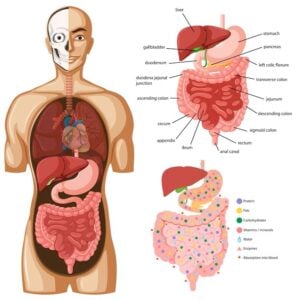As pain manifests on the right side of the stomach and creeps up toward the shoulder, it can feel perplexing and even a little unsettling. This discomfort could stem from simple causes, like trapped gas, or signal something more serious, such as gallstones, appendicitis, or even kidney stones. Occasionally, the pain brings along companions—nausea, bloating, or changes in bathroom habits—leaving anyone concerned about what’s really going on inside. It is crucial to understand what these symptoms may signify, so let us examine what could be happening behind the scenes.
Excess Gas
Sometimes, even something as simple as excess gas can trigger pain in the right side of the stomach and even the shoulder. When the intestine becomes distended through trapped air, right-sided abdominal pain can occur, often leaving people feeling bloated and uncomfortable.
This pain, which is caused by gas, can develop after eating—especially when meals include foods that are harder to digest. As the gas accumulates, it may also bring on symptoms like a feeling of fullness, loss of appetite, heaviness, burping, or increased flatulence. These sensations can be distressing, yet they are very common and usually harmless.
Drinking plenty of water often helps relieve discomfort, and in some cases, doctors might suggest gentle laxatives to support digestion and ease symptoms.
Irritable Bowel Syndrome (IBS)
While excess gas is a common cause of right-sided stomach and shoulder pain, sometimes the discomfort signals something more complex, like irritable bowel syndrome (IBS).
IBS often brings a cramping pain that can show up in the upper abdomen or even the upper right abdomen. For many, this pain eases after a bowel movement but could return, sometimes alongside bloating, diarrhea, or constipation.
People with IBS might notice their symptoms worsen during times of stress or after eating certain foods. The exact cause of IBS isn’t fully understood, but links with anxiety and mental health are common.
A doctor can help pinpoint whether IBS is behind the right side pain and suggest a treatment plan, which could include medications and changes in diet.
Gallstones and Acute Cholecystitis
Even though stomach pain can have many causes, gallstones and acute cholecystitis often stand out at the time that pain is sharp, sudden, and radiates to the right shoulder. Should gallstones block the flow of bile in the gallbladder, inflammation develops, leading to upper abdomen pain that can quickly become severe.
This type of gallbladder disease occurs more often in women and is especially common among those of Scandinavian, Native American, or Hispanic backgrounds. Individuals living with obesity, experiencing rapid weight loss, or eating a high-cholesterol diet might be at higher risk.
- Symptoms could include nausea, vomiting, fever, and tenderness in the upper abdomen.
- Pain can move from the abdomen to the right shoulder as inflammation worsens.
- Diagnosis often involves abdominal ultrasound and special imaging tests to confirm gallbladder disease.
Appendicitis
Although stomach and shoulder pain on the right side can be linked to gallbladder issues, appendicitis stands out as another urgent cause that shouldn’t be disregarded. The appendix, a small pouch in the digestive system, can become inflamed and infected—usually causing pain that begins near the belly button and then shifts to the lower right abdomen. This pain often exacerbates with movement, coughing, or even deep breaths.
It’s crucial to pay close attention to other symptoms, like nausea, vomiting, and fever, which often appear together. Neglecting these signs can be perilous, as untreated appendicitis may cause the appendix to rupture, leading to a life-threatening infection. Anyone experiencing these symptoms should seek medical care promptly to safeguard their health and prevent complications.
Acute Hepatitis
Acute hepatitis is a sudden inflammation of the liver that can cause sharp pain in the right upper side of the abdomen, sometimes radiating toward the right shoulder. This condition might emerge from viral infections, heavy alcohol use, certain medications, or autoimmune disorders.
The pain often comes with nausea, vomiting, loss of appetite, headaches, and sometimes jaundice, which is yellowing of the skin and eyes. Since hepatitis can be acute or chronic, it’s essential not to overlook these signs. If you come across these symptoms, visit your physician and schedule an appointment promptly.
- Hepatitis A can present with symptoms that are different from other types.
- Rest, hydration, and avoiding fatty foods are crucial for recovery.
- Seeking medical attention is important to prevent serious complications.
Prompt action helps protect your health.
Pancreatitis
Pancreatitis brings a sharp, radiating pain in the upper abdomen that can stretch to the back and sometimes the left shoulder, creating confusion with other causes of stomach and shoulder pain.
This intense discomfort often starts abruptly and can be provoked by gallstones, heavy alcohol use, certain medicines, and even infections.
Quick medical care is crucial since treatment options—like pain alleviation, antibiotics, or sometimes surgery—rely on how severe the inflammation is and what instigated it in the beginning.
Radiating Abdominal and Back Pain
Anytime severe pain suddenly grips the upper abdomen and commences spreading toward the back or even the left shoulder, it can feel frightening and overwhelming. This type of pain often points to pancreatitis, an inflammation of the pancreas—a crucial organ nestled near the small intestine and closely linked to how the body breaks down food and stores bile.
People might notice this pain soon after eating a heavy, fatty meal or drinking alcohol, and the discomfort can be sharp, persistent, or even throbbing.
- The pain could radiate toward the back or left shoulder, making it difficult to find comfort in any position.
- Pancreatitis can bring nausea, vomiting, and sometimes a fever or low blood pressure.
- A firm or tender area in the upper abdomen can sometimes be felt, adding to the distress.
Recognizing these symptoms and seeking medical guidance is essential.
Triggers and Treatment Options
For many people, the exploration into comprehension what sparks pancreatitis—and how it’s managed—can feel puzzling and even a little daunting.
Distress typically starts in the upper abdomen and could go around to the back or even the left shoulder, frequently after consuming or ingesting alcohol. Some prevalent causes of pancreatitis include heavy alcohol use, gallstones, or certain medications.
It’s crucial to seek medical care if symptoms like nausea, vomiting, fever, or yellowing skin appear, because this condition can become serious rapidly. Treatment options are customized for each person but may involve pain relief, antibiotics, and sometimes surgery if complications arise.
When someone experiences this type of pain, tackling the triggers and exploring care options promptly can make a substantial difference in recovery.
Kidney Stones
Have you ever pondered why pain in the right side of your stomach sometimes creeps up toward your shoulder or even down to your groin? Kidney stones could be the culprit. These hard deposits, made from crystallized minerals and salts, can form in your kidneys and cause intense, cramping pain.
Should you often feel a sudden need to go to the bathroom or notice blood in your urine, it might be a sign of a kidney stone. Nausea, vomiting, and trouble urinating are also common. To prevent kidney stones, it’s wise to avoid foods high in sodium and animal protein, drink plenty of water, and maintain a healthy weight.
- Severe pain radiating from the abdomen to the groin
- Nausea and vomiting episodes
- Blood in the urine and difficulty urinating
Conclusion
Right-sided stomach and shoulder pain is more common than you may comprehend. In fact, about 20% of people will experience gallstones at some point in their lives—a frequent cause of this discomfort. Identifying the symptoms and understanding the possible causes can help you know when to seek care. With timely diagnosis and treatment, you or your loved one can find relief and peace of mind. Recall, it always pays to listen to your body.





